Which Programming Languages Are Used Most Often in AI Development?
Table Of Content
Published Date :
05 Sep 2025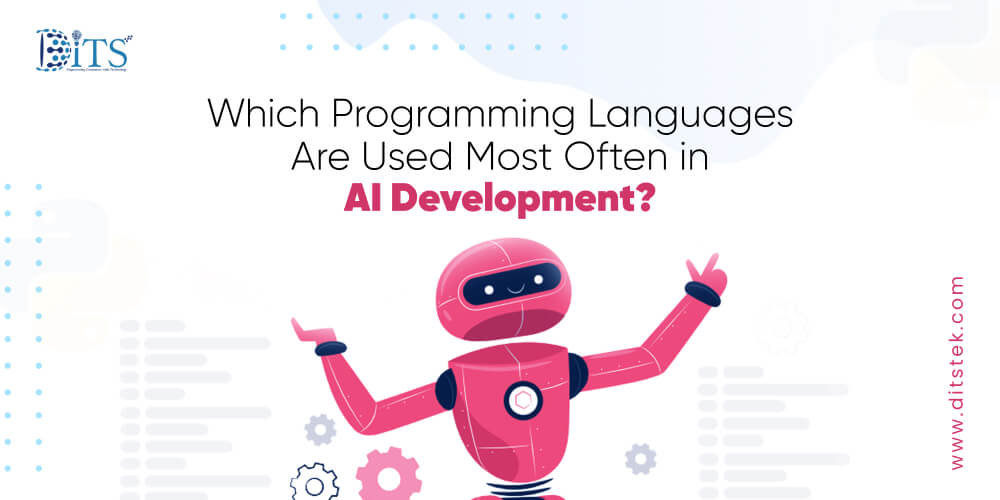
Artificial Intelligence (AI) is no longer just a buzzword; it is a driving force behind innovation across industries. From automating workflows to delivering smarter customer experiences, AI is reshaping how businesses operate and compete. For business owners and tech leaders, understanding the role of programming languages in AI is crucial, as it directly impacts the efficiency, scalability, and success of projects.
Choosing the right foundation can determine how well your solutions adapt to evolving needs. In this blog, we’ll explore the most widely used programming languages in AI development and why this knowledge matters when partnering with experts offering AI development services.
Want AI Solutions Built for Your Business?
Selecting the right programming language is only the start. Learn how our team transforms AI concepts into scalable business outcomes aligned with your growth vision.
Why Programming Languages Matter in AI Projects
The success of an AI solution does not depend only on the algorithms—it also relies on the programming language used to build it. The right choice can make a significant difference in performance, cost, and long-term sustainability. For business owners and tech companies, this means that language selection goes beyond a technical detail; it becomes a strategic decision.
A well-chosen programming language ensures faster development cycles, better integration with your existing systems, and the ability to scale as your business grows. It also affects how quickly an AI development company can bring your solution to market and how easy it will be to maintain and enhance over time. On the other hand, the wrong choice may lead to higher costs, performance bottlenecks, and difficulties in finding skilled developers.
For companies planning to invest in AI, working with a trusted AI software development company helps minimize these risks. Experienced teams know which languages align best with specific use cases—whether you need predictive analytics, intelligent automation, or next-generation solutions like generative AI development services.
Most Popular Programming Languages for AI Development
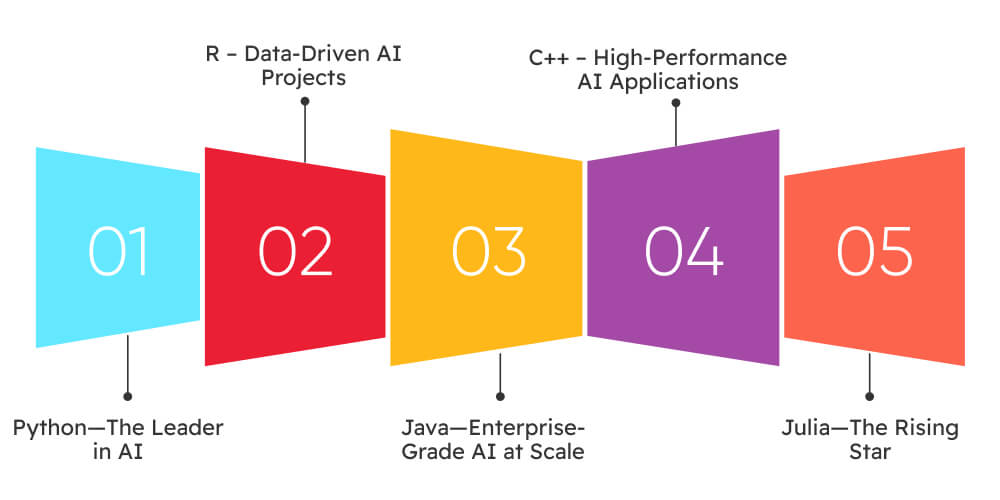
When exploring AI development services, one of the most common questions business leaders ask is, “What programming language does AI use?” The answer depends on project needs, industry, and the kind of AI solution being developed. Below are the most widely adopted languages and their significance for businesses investing in AI.
Python – The Leader in AI
Python has become the top choice for AI because of its simplicity, vast community support, and a wide range of libraries like TensorFlow, PyTorch, and Scikit-learn. These frameworks make it easier to build everything from chatbots to advanced predictive models. For businesses, Python offers quick prototyping, cost efficiency, and adaptability across industries such as healthcare, retail, and finance.
R – Data-Driven AI Projects
R is widely used in industries where statistical analysis and data visualization are essential. Healthcare, research, and financial organizations rely on R for data-heavy AI applications. If your business deals with complex datasets, R provides the analytical power to transform raw data into actionable insights.
Java – Enterprise-Grade AI at Scale
Java is the language of choice for enterprises that require stability and scalability. It powers applications in banking, e-commerce, and logistics, where large-scale systems must integrate AI smoothly. With frameworks like Deeplearning4j, Java is well-suited for enterprise-grade AI applications developed by a custom AI development company.
C++ – High-Performance AI Applications
C++ is known for speed and efficiency, making it ideal for real-time AI applications such as robotics, gaming, and autonomous systems. Businesses exploring innovation in these fields often rely on AI software development company expertise to leverage C++ for maximum performance.
Julia – The Rising Star
Julia is gaining popularity in scientific and numerical computing. It is designed for high-performance tasks and is increasingly being used in industries that need speed and accuracy, such as research labs and AI-driven startups. Though relatively new, it shows strong potential for future enterprise adoption.
Other Notable Mentions
- JavaScript: Useful for AI in web applications and front-end development.
- Scala: Often chosen for AI solutions involving big data and Apache Spark.
- MATLAB: Popular in academic and engineering projects for prototyping AI algorithms.
Which AI Language Fits Your Industry Best?
From healthcare to finance, every industry demands unique AI capabilities. Find out how our custom development approach ensures solutions that scale with precision.
Choosing the Right Language for Your AI Project
Selecting the right programming language is more than just a technical choice—it’s a business decision that directly influences outcomes. Each language offers different strengths, and the decision should align with your project’s goals, industry requirements, and future scalability.
When evaluating options, consider factors such as
- The complexity of the project
- Budget and development timelines
- Availability of skilled developers
- Integration with your existing technology stack
- Long-term maintenance and adaptability
For example, Python may be ideal for rapid prototyping, while Java could better serve an enterprise system requiring long-term stability. Similarly, C++ might be the right fit for real-time solutions in robotics.
Business leaders often ask how to use AI in software development to maximize efficiency and reduce costs. The answer lies in understanding that language choice impacts not only speed but also how well AI integrates with your business systems. By partnering with an experienced AI development company, you gain the advantage of expert guidance in aligning the right language with your goals.
Industry Examples & Use Cases
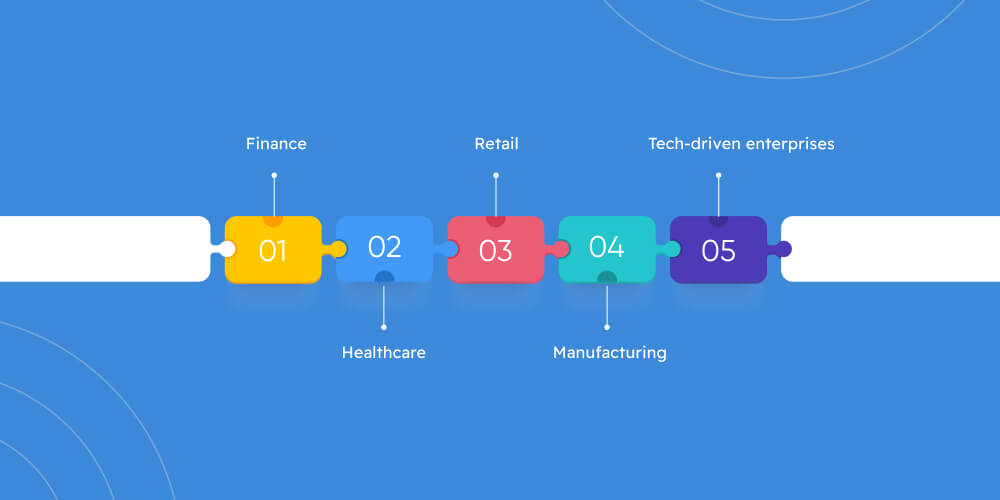
AI is transforming industries across the globe, and the choice of programming language often determines the efficiency of these applications. Below are some practical examples that highlight how different languages are used in real-world scenarios.
Finance: Python is heavily used in fraud detection, algorithmic trading, and predictive analytics. Its extensive libraries make it a strong fit for financial institutions looking to innovate faster while maintaining security.
Healthcare: Both R and Python are applied in clinical research, medical imaging, and predictive diagnostics. These languages allow for advanced statistical modelling, helping healthcare providers improve patient outcomes.
Retail: Java plays a central role in powering recommendation engines, inventory forecasting, and personalised shopping experiences at scale. Large enterprises often choose Java for its stability and scalability.
Manufacturing: C++ is widely used in robotics, automation, and IoT-based systems where performance and precision are critical. For businesses investing in smart factories, C++ provides the speed needed for real-time operations.
Tech-driven enterprises: More companies are exploring AI for software development to improve productivity and code quality. At DITS, we integrate AI into every software we build, supporting quality assurance, maintaining code standards, and tailoring solutions to meet client needs.
Each of these examples highlights that programming languages are not one-size-fits-all. Instead, businesses should consider their unique goals and choose the right approach with guidance from an experienced AI software development company.
Looking for Scalable AI Development Services?
The right language fuels efficiency, but expertise ensures results. Partner with our team to build AI that integrates seamlessly into your enterprise systems.
How Businesses Can Leverage AI Development Services
For business owners and tech companies, knowing which programming languages power AI is only the first step. The real advantage comes from working with the right partner who can apply this knowledge effectively. Partnering with an experienced AI software development company ensures that your solutions are designed to align with industry standards, business goals, and future scalability.
Modern enterprises are not just adopting AI—they are integrating it across every aspect of their operations. From automating customer support with AI chatbot development services to enhancing creativity with generative AI development services, companies are finding new ways to improve efficiency and deliver better customer experiences.
A trusted custom AI development company can help you determine the right mix of technologies, programming languages, and frameworks for your unique business challenges. This ensures lower risks, optimised costs, and faster time-to-market.
At DITS, we use AI for software development not only in creating intelligent applications but also in ensuring quality assurance, maintaining clean code standards, and customising solutions to fit client needs. By weaving AI into every project, we help businesses stay competitive in rapidly changing markets.
How DITS Can Help with AI Software Development
DITS goes beyond traditional development by embedding AI intelligence directly into your business workflows. Unlike many providers, we don’t just deliver applications—we design future-ready ecosystems. Our team leverages domain expertise to build scalable platforms that combine automation, predictive analytics, and intelligent decision-making.
Whether it’s deploying AI chatbot development services for customer engagement, harnessing generative AI development services for creative problem-solving, or integrating smart algorithms into enterprise systems, we align AI with your growth strategy. At DITS, we also apply AI for software development itself—automating quality assurance, strengthening code reliability, and enabling faster innovation. This approach ensures that every solution we build is not only custom-fit but also capable of evolving with your business.
Need Expert Advice on AI Development?
AI projects succeed when strategy meets execution. Our specialists offer tailored guidance on language, frameworks, and architecture to maximize business outcomes.
Conclusion
Programming languages form the backbone of every AI project, and choosing the right one can determine the success of your investment. Python continues to lead the way, but other languages like R, Java, C++, and Julia all have unique strengths that make them valuable in specific business contexts. For decision-makers, the key is not just understanding what programming language does AI use but also aligning that choice with business objectives, scalability, and future growth.
By partnering with a skilled AI development company, businesses can ensure that they make informed technology choices that drive long-term results. Whether it’s building enterprise-grade solutions, exploring innovation with new tools, or adopting intelligent automation, the right AI development services can transform ideas into measurable business impact.
FAQs
1. Which programming language is best for AI development?
Python is the most widely used programming language due to its simplicity and robust AI libraries. However, R, Java, C++, and Julia are also used depending on project requirements.
2. How do I know which programming language suits my AI project?
It depends on your goals, scalability needs, and the specific industry you're in. A skilled AI development company like DITS can help you choose the right language for long-term success.
3. Can AI be applied to existing software systems?
Yes, with the right approach, AI can be integrated into existing applications to enhance automation, analytics, and customer engagement.
4. What industries benefit most from AI software development?
Finance, healthcare, retail, logistics, and manufacturing are leading adopters. Each uses AI differently, including fraud detection, patient care, personalization, and automation.
5. How does DITS use AI for software development?
At DITS, we integrate AI into our development process, improving code quality, automating QA, and customizing features—ensuring more innovative, more reliable solutions.
6. What is the role of AI chatbots and generative AI services for businesses?
AI chatbot development services improve customer support, while generative AI development services drive innovation by enabling content creation, personalization, and faster problem-solving.

Dinesh Thakur
21+ years of IT software development experience in different domains like Business Automation, Healthcare, Retail, Workflow automation, Transportation and logistics, Compliance, Risk Mitigation, POS, etc. Hands-on experience in dealing with overseas clients and providing them with an apt solution to their business needs.
Recent Posts
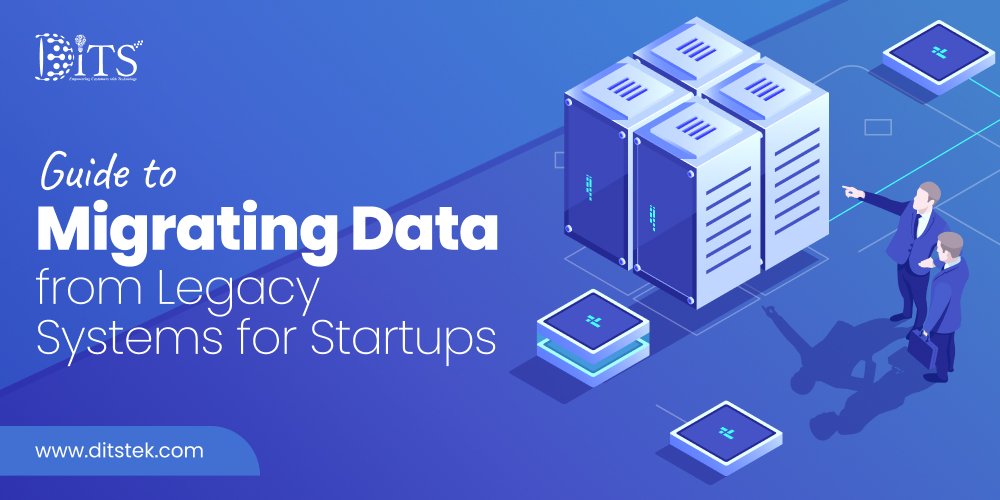
Learn how to migrate data from legacy systems for startups step by step. This easy guide helps modern businesses migrate smoothly and avoid data loss.
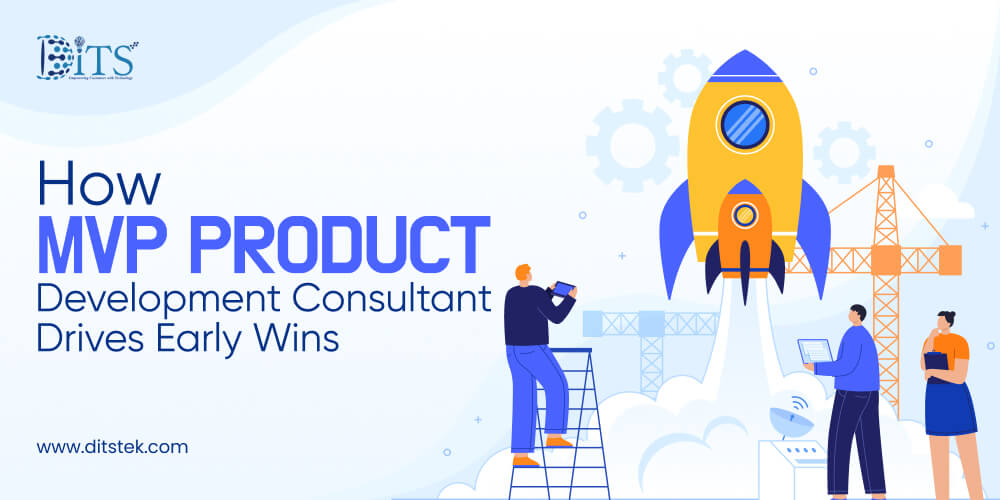
An MVP product development consultant helps leaders validate ideas early, reduce execution risk, and build confident momentum before committing significant time, budget, and resources strategically.
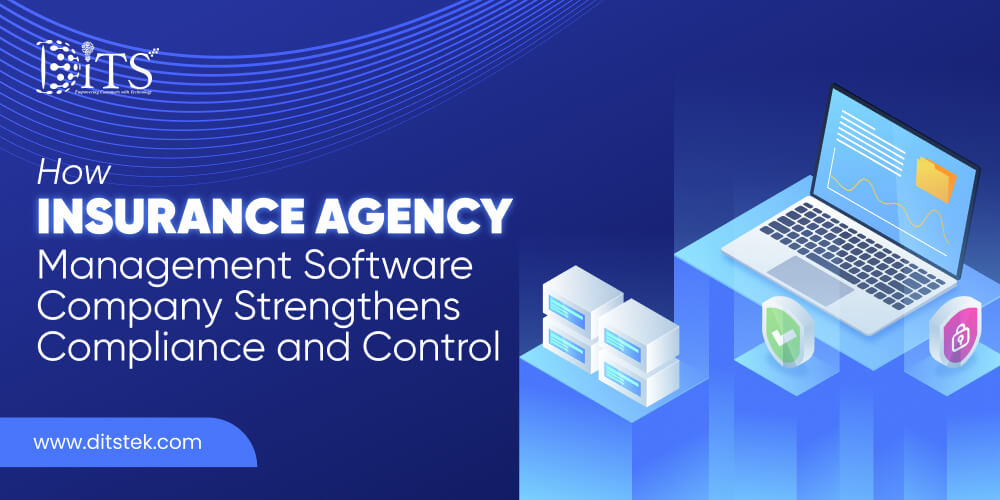
Learn how insurance agency management software company platforms embed governance, automate compliance, enhance data control, and give leadership real time visibility for scalable operations growth.